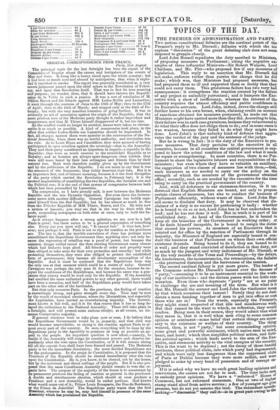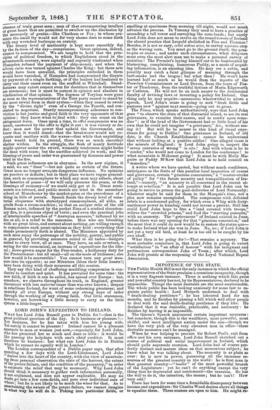TOPICS OF THE DAY.
THE PREMIER ON ADMINISTRATION AND PARTY, Two serious constitutional fallacies are the cardinal points of the Premier's reply to Mr. Disraeli ; fallacies with which the too copious " discussion " of the great debating club does not seem disposed to grapple closely.
Lord John Russell repudiates the duty ascribed to Ministers, of proposing measures in Parliament; citing the negative ex- amples of three influential Ministers—Sir Robert Walpole, Lord Chatham, and Mr. Pitt—who proposed few if any measures of legislation. This reply to an assertion that Mr. Disraeli did not make, enforces rather than parries the charge that he did make ; which was, that Ministers had proposed measures, but had prepared them so ill and supported them so feebly that they could not carry them. This gratuitous failure has two very bad consequences : it strengthens the reaction created by the failure of any project so unluckily patronized ; and it hampers the Exe- cutive with a show of inefficiency, whereas the interest of the country requires the utmost efficiency and public confidence in its Executive servants. Lord John, indeed, drove the charge still further home to his own breast, when, claiming credit on account of sanctions obtained for measures postponed, he made out that Ministers might have carried more than they did. Accordingto him, their failure was in each case gratuitous, because they volunteered to do what their office does not oblige them to do; and in some cases it was wanton, because they failed to do what they might have done. Lord John's is that unlucky kind of defence that aggra- ' votes the verdict of the jury and the sentence of the judge.
But he is wrong in fact: it is the duty of the Executive to pro- pose measures. That duty pertains to the executive in all countries, because in all countries the central government is sup- posed to know the actual condition of the law and what it needs, for repair or strengthening. In most countries, there is no Par.. liament to share the legislative labours and responsibilities of the ministers ; but even where they have so valuable an auxiliary, the suggestion of two classes of measures lies with them,—first, such measures as are needed to carry out the policy on the strength of which the members of the government obtained office ; secondly, such as are needed by the executive for the time being to carry on the practical government of the country. And, with all deference to our statesman-historian, be it un- derstood that English Ministers are bound, not only to propose certain classes of measures, but also to conduct the business of Parliament efficiently, without waste of time. Lord John Rus- sell seems to disclaim that duty. It may be observed that dis- claimer of a duty is no excuse for performing it badly : whether he is bound to do so or not, Lord John has in fact undertaken the head; and he has not done it well. But in truth it is part of his established duty. As head of the Government, he is bound to keep all the branches of the Government in working order; or if he finds himself incapable, he is bound to resign the duties that exceed his powers. As members of an Executive that is pointed out for office by the sanction of Parliament through its majority, the Ministers of England are especially bound to con- duct the business of that Parliament on whom their own official existence depends. Being bound to do it, they are bound to do it well ; and they stand convicted of dereliction in that duty, not so much by the pungent and witty indictment of Mr. Disraeli, as by the very records of the Votes and Proceedings—by the delays, the hinderances, the inconsistencies, the retractations, the failures —the protracted duration and the barrenness of the session.
The second cardinal fallacy is yet more grave. The leader of the Commons echoes Mr. Disraeli's lament over the decease of "party,"—assuming it, to be an instrument essential to the work- ing of our institutions : and the dictum passes with too little exa- mination. Even those who deprecate " party " are at no pains to challenge the use and meaning of the term. But what is it that Mr. Disraeli the accuser and Lord John the vindicator mean by that which occasions their lament ? Surely they do not den- derate a mere banding together of men to get into office or oust those who are in ? From the words, especially the Premier iii they might stand suspected of that idle and mischievous wish. But that cannot be the want to which, on reflection, they would confess. Being men in their senses, they would admit that what they mean is, that it is well when men cling to some common opinion or sentiment—some belief that certain things are neces- sary to the existence or welfare of their country. The thing wanted, then, is not "party," but some commanding opinion, some great and powerful sentiment, which unites men in mind, heart, and hand; which thus simplifies political action, and forti- ties political agents ; which lends nerve to the arm of the Exe- cutive, and strenuous activity to the vital energies of the country. This is the want to be deplored ; not the decay of those banded
partisans, those political clubs, into which party had degenerated, and which were only less dangerous than the suppressed clubs of Paris or Dublin because they were more selfish, and were pledged to order by every bond of possession and of corrupt en- joyment. If it is asked why we have no such great leading opinions and convictions, the causes are not far to seek. The time lacks men to embody great opinions. We have a "reformed" House oi
Commons, but not reformed statesmen. One or two of higher stamp stand aloof from active service ; a few of younger age give
promise, but do not yet assume the lead. The redundant speech'. making—" discussion" they call it—is in great part owing to the absence of truly great men ; men of that overmastering intellect or great heart that are permitted to swallow up the discussion by the monopoly of genius—like Chatham or Fox ; in whose pre- sence the small fry would not for very shame dare to come forth with any wretched burlesque on oratory. The dreary level of mediocrity is kept more smoothly flat by the fashion of the day—compromise. Great opinions, indeed, cannot be compromised. We are taught to hold that the prin- ciples of political freedom, to which Englishmen stood in the seventeenth century, were signally and cogently vindicated when Hampden refused the payment of ship-money, and when the ultimo, ratio was turned against Charles the King: but those acts would have been annulled, the principles embodied in them would have vanished, if Hampden had compromised the dispute by payment of a single farthing, or if the leaders had hesitated to carry out their cause even on the scaffold at Whitehall. Stead- fastness may extort respect even for doctrines that in themselves are erroneous; but it must be earnest in opinion and absolute in vindication of that opinion. The dogmas of Toryism were gone as soon as the representatives of the Tory party ceased to stand by the most trivial form in their system—when they ceased to swear by the "divine right" even of a George the Fourth, and con- sented to negotiate. Sturdy uncompromising adherence to con- viction is but justice and good faith to the very opponents of that opinion : they know,what to:deal with : they can count on the antagonist force. Once upon a time, to offer compromise was an insult, answered by the offer to fight it out : it was victory or de- feat: men saw the power that upheld the Government, and knew that it would stand—that the breakwater would not co- quette and oscillate with the waves—that while that unyielding front would hold its ground, there was so much smoother shelter within. In the struggle, the flesh of manly fortitude might quiver under the sword, womanly tenderness might bathe the dead with tears; but the sacrifice achieved its work, and the blessing of peace and order was guaranteed by firmness and power tried in the fire.
Such great influences are in abeyance. In the new regime, it is said, we are "freer "—but not quite so certain of the future. Great men no longer arrogate dangerous influence. No opinions are positive or definite ; but in their place we have vague general- ities, such as commonplaces to which any man may adhere, about the beauties of peace--if we will only presume the peace, or the blessings of economy—if we could only get at it. Great senti- ments are tabooed, and public morals are tried in the ascendant school of Manchester by the market-price or the precedence of a thing in bills of parcels. Speech floods the dreary level of sena- torial eloquence, with stereotyped commonplaces, all alike, as gdods from a steam-machine; so that an antique relic of the old Roman mint, inflamed by the pocket Etna of a studied elocution- ary fire, is a precious object of vertii; and even the practical joke of interminable speeches of "Ansteyan measure," inflamed by no fire at all, is a relief to the sameness. Men who are labouring with no great ideas, and earnest about nothing, are willing enough to compromise such quasi-opinions as they hold : everything that stands prominently forth is abated. The Ministers appointed by such men repay the patronage of the nobility, gentry, and public in general, by providing measures suited to all tastes—budgets suited to every view, all at once. They have, on sale or return, a saving for the economical, an increase of expenditure for the libe- ral; slave-grown sugar for the Free-trader, a halfpenny duty for the Protectionist : but all small—all on the scale of littleness ; else how would it he convertible? You cannot turn any great mea- sure into its opposite ; as our Ministers (bless their little hearts!) have been doing with their measures all this session. They say this kind of chaffering muddling compromise is con- ducive to comfort and quiet. It has prevailed for some time : the new faith, if faith it can be called, has spread over Europe : but, somehow, we observe throughout its track, in England, greater discontent with less material cause than was ever known ; despair in rebellious Ireland, for want of some redeeming greatness; and anarchy all over Europe, without any strong hope of order through the working of any strong faith. Our little statesmen, however, are borrowing a little money to carry on the little system a little longer.



























 Previous page
Previous page